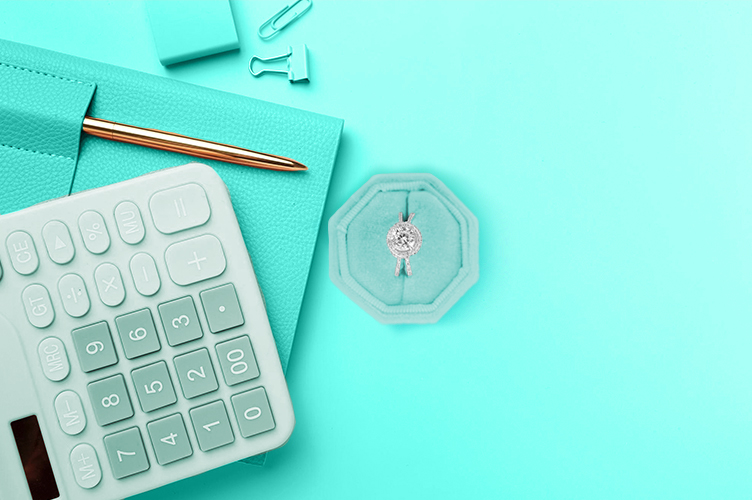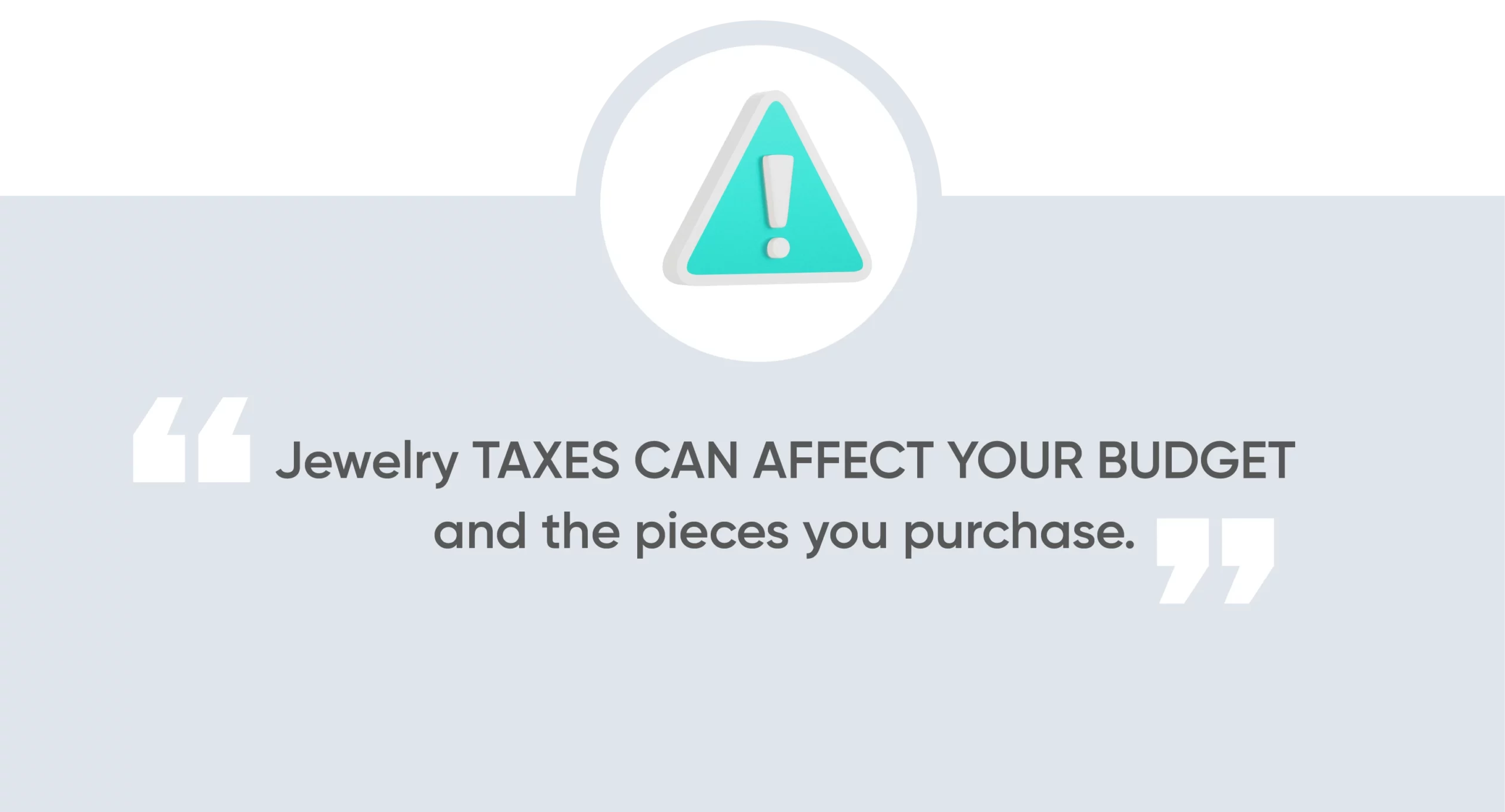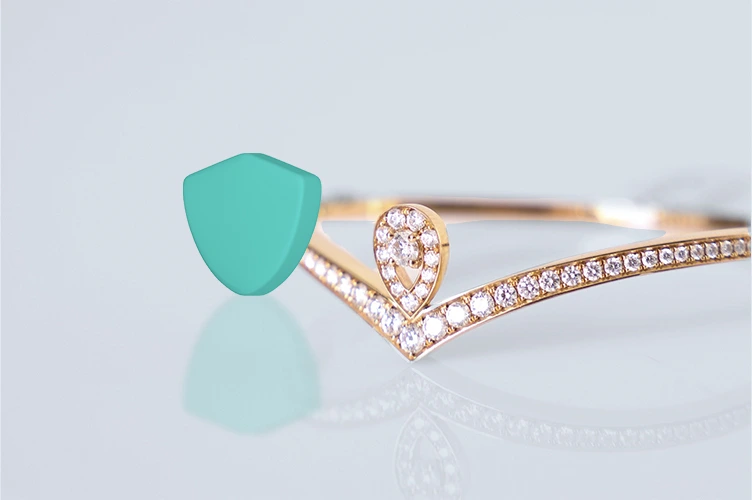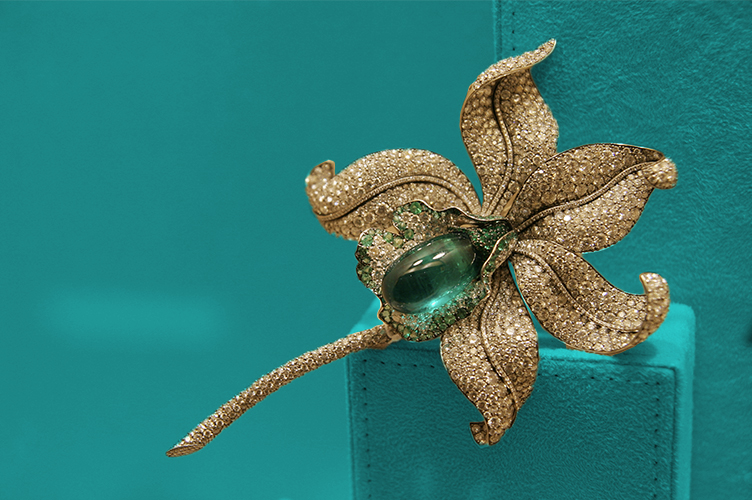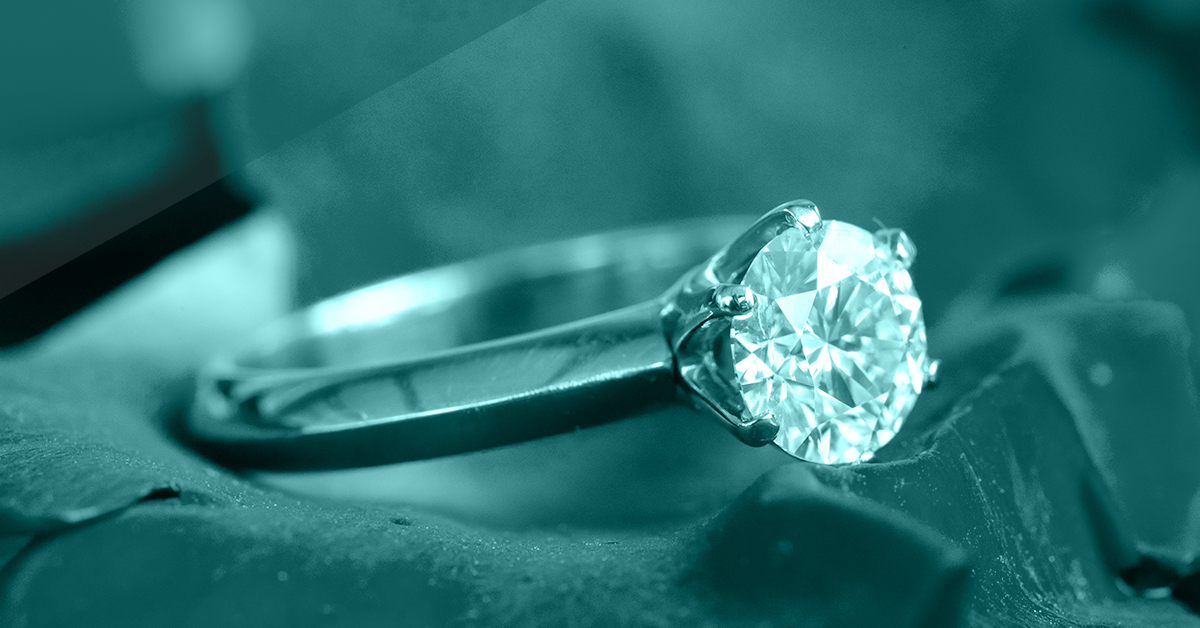Buying fine jewelry like an engagement ring or platinum bracelet is a great way to treat yourself or show someone how much you care. Choosing the perfect piece takes time and care. You’ll have to decide on style elements, metal options, precious stones, and pricing options.
Before making your purchase, you should also understand your tax responsibilities and jewelry insurance options. Jewelry taxes can affect your budget and the pieces you purchase. Understanding your jewelry insurance options helps protect your new piece for years.
What You Will Learn
Tax on Jewelry
Most US states charge sales tax on the sale of jewelry. Understanding jewelry sales tax by state is crucial as it varies significantly, with California having the highest rate of 7.5%. Oregon, Alaska, Delaware, New Hampshire, and Montana are the only states without a sales tax on jewelry.
If you’re purchasing an expensive piece like an engagement ring or an 18k gold necklace, even a small tax can quickly add up. For example, with a large diamond engagement ring you could be looking at hundreds or thousands of dollars in addition to the item’s sale price due to the sales tax on diamonds.
To avoid paying more in sales tax, consider making your purchase online. Internet retailers that only operate online and other sellers that don’t have a brick-and-mortar store located in your state may be sales-tax-free. However, you may still be charged a use tax by your state.
Taxes if You’re Selling Jewelry
The IRS treats platinum, gold, and diamond jewelry as a capital asset for individuals. If you purchase a ring or necklace that you intend to enjoy or use but later sell for a profit, you will owe capital gains taxes.
For example, if you purchase a necklace for $300, this price is its fair market value. If you sell it for more than $300, the profit from the sale is taxed. Your capital gains tax rate corresponds with your income tax bracket and can range from zero to 20%.
If you sell your jewelry for less than its fair market value, this is considered a capital loss. Any capital losses from the sale of your jewelry help lower your capital gains tax liability.
Inherited Jewelry Tax
If you inherit a pair of diamond earrings, a gold bracelet, or other fine jewelry, you have to remember there are taxes on selling inherited jewelry. When you inherit precious metals like gold, its value counts toward the total sum of money you can inherit without paying estate taxes. You’ll only be responsible for paying estate taxes on the jewelry if your inheritance is over $12,060,000.
You may have to pay capital gains taxes if you choose to sell your inherited jewelry. Before you can sell your inherited pieces, you need to have them professionally appraised to determine their current market value. This value may be substantially different from the jewelry’s initial value.Some say the best way to sell inherited jewelry is to visit a jeweler as they can appraise and then buy your jewelry as well if they like what they see.
For instance, your grandmother may have paid $500 for a diamond ring many years ago. If you appraise it today, it may be worth $5,000. The current market value is used to determine tax liability. If you sell the ring for $6,000, you will pay taxes on the $1,000 difference in price. Inherited gold and precious metals are subject to a 28% capital gains tax. Similarly, if the jewlery in not inherited, there’s still taxes on selling gifted jewelry as well.
How Does Jewelry Insurance Work?
A jewelry insurance policy provides replacement coverage for any damage, theft, loss, or mysterious disappearance of your jewelry. Many jewelry insurance providers, like BriteCo, offer this coverage once you submit details about the item, including an appraisal from a certified jeweler.
After you provide the insurance provider details about your jewelry, you are offered a quote and can purchase the policy. BriteCo offers zero-dollar deductibles, so you won’t have to pay out-of-pocket to receive reimbursement for your jewelry. Compare monthly payments, deductibles, and other amenities each insurer offers to find the best policy for your needs.
When loss or damage occurs, you file a claim with your jewelry insurer to receive the replacement value of your item. The coverage limit of your reimbursement varies between insurers. Jewelry insurance offers more coverage than a jewelry warranty or homeowner’s insurance policy. Although many people think their fine jewelry collection is covered by their homeowner’s insurance, most insurers only pay for up to $1,500 per item. This is not enough coverage for anything like an expensive Tiffany jewelry piece.
What Does Jewelry Insurance Cover?
Jewelry insurance coverage depends on your provider and the policy you choose. Most traditional jewelry insurance policies offer coverage for lost, stolen or damaged items. This typically includes theft coverage as well.
If you obtain jewelry insurance through a general insurance company, your policy likely won’t cover mysterious disappearance. However, if you get coverage from a jewelry-specific insurer, your policy may cover this event.
Traditional jewelry insurance providers like Jeweler’s Mutual offer coverage for 100% of your piece’s insured value. However, if you compare this to BriteCo’s offer of 125% of your jewelry’s insured value, you can find better coverage for your pieces.
BriteCo jewelry insurance boasts a 5-star coverage rating which gives you complete peace of mind for your high-value jewelry. With a jewelry insurance policy from BriteCo, your coverage includes:
- 125% of its appraised value
- Automatic value updates each year
- Worldwide coverage
- Coverage on loss, theft, damage, and mysterious disappearance
- Zero deductible
- Option to pay monthly or annually
- Limited adverse claims impact
- Discount for safe storage
- Preventative maintenance on worn, bent, or broken prongs
Does Homeowners’ Insurance Cover Lost Jewelry?
Your homeowners’ insurance policy may offer limited coverage for your important jewelry pieces. However, the coverage homeowners’ or renters’ insurance provides is minimal and may only apply under specific conditions.
Homeowner’s insurance typically only covers up to $1,500 for personal items like jewelry. If your pieces have a higher appraisal value, the gap in your coverage must be paid out of pocket.
Renters’ and homeowners’ insurance policies usually come with limited riders that deny coverage for damaged, lost, or mysteriously disappeared jewelry. These policies may carry a high deductible that forces you to pay out-of-pocket before replacing your piece. Claiming through these policies may also increase your premiums or prevent you from obtaining future coverage due to a poor claims history.
Filing an Insurance Claim for Lost Jewelry
According to a recent BriteCo survey, 59% of people who purchased a jewelry insurance policy filed a claim within the past decade. This number suggests that losing or misplacing jewelry happens often. It also indicates that if you own expensive or unique jewelry, it is beneficial to obtain insurance coverage for your piece and understand how to file a claim if the undesirable happens.
With BriteCo, filing a claim for your lost jewelry is simple and takes about five minutes. You’ll start by visiting our claims page and following the convenient prompts.
These prompts ask for your policy number with BriteCo and the details about the piece. Once you fill out the required information, our claims team will check in with you and start a repair or replacement for your item.
Unlike other jewelry insurers, BriteCo doesn’t carry a deductible. You don’t have to pay an upfront dollar amount to process a claim on your lost or missing piece. BriteCo also automatically updates the value of your jewelry each year, so you don’t need to worry about your claim fulfillment not meeting your jewelry’s most up-to-date value.
Insure Your High-Value Jewelry with BriteCo
If you own high-value jewelry, it is essential to protect your pieces from loss, harm, theft, or mysterious disappearance. Insure your finery with a jewelry insurance policy from BriteCo. BriteCo offers a fast, convenient quote for full coverage on one-of-a-kind inherited pieces, engagement and wedding rings, and luxury watches.
Obtain a quote online in a matter of minutes so you can have peace of mind that your jewelry is protected.
Also Check:
Does Travel Insurance Cover Lost Jewelry?
How Do You Finance An Engagement Ring
Should You Buy a Diamond Engagement Ring Online or at a Jewelry Store?

